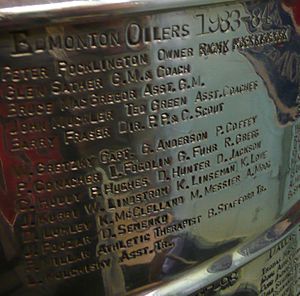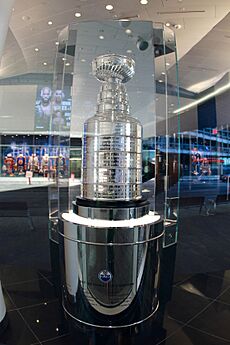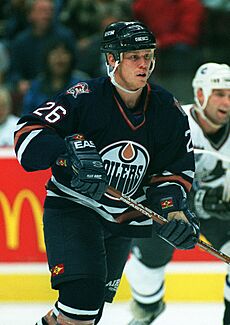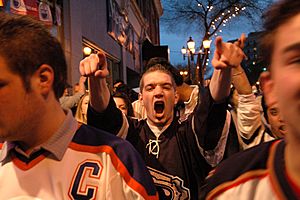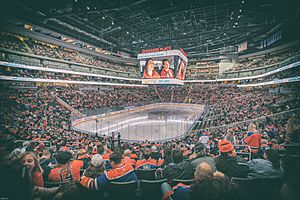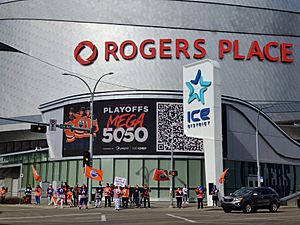History of the Edmonton Oilers facts for kids
The history of the Edmonton Oilers began in 1972 when the team was formed as a professional ice hockey team in Edmonton, Alberta. The team first played in the World Hockey Association (WHA) before joining the National Hockey League (NHL) in 1979. The Oilers were one of the 12 original teams in the WHA's first season in 1972–73. They were first called the Alberta Oilers for a short time, but then changed back to the Edmonton Oilers for the 1973–74 season, and have been known by that name ever since. In 1979, the Oilers joined the NHL as one of four teams from the WHA.
After joining the NHL, the Oilers became very successful, winning the Stanley Cup five times: in 1984, 1985, 1987, 1988, and 1990. Because of their amazing success in the 1980s, the Oilers team from that time is called a "dynasty" by the Hockey Hall of Fame. During the NHL's Centennial Season celebrations, four of these Cup-winning Oilers teams were ranked among the Top Ten NHL Teams of all time. The 1984–85 Edmonton Oilers team was even voted the NHL's Greatest Team in its first 100 years.
Contents
WHA Years (1972–1979)
On November 1, 1971, the Edmonton Oilers became one of the 12 founding teams of the World Hockey Association (WHA). The team was started by "Wild" Bill Hunter and his partner, Dr. Charles A. "Chuck" Allard. Bill Hunter had also owned a junior hockey team, the Edmonton Oil Kings. He wanted to bring a major professional hockey team to Edmonton, but the NHL wasn't interested. So, Hunter looked to the new WHA instead. Hunter chose the name "Oilers" for the new team, a nickname that had been used for the Edmonton Oil Kings in the past.
At first, the team was called the Alberta Oilers because there were plans to play games in both Edmonton and Calgary. But the team ended up playing all its home games in Edmonton and changed its name back to the Edmonton Oilers the next year. They won the very first game in WHA history, beating the Ottawa Nationals 7–4.
The Oilers had popular players like defenceman and captain Al Hamilton, goaltender Dave Dryden, and forwards Blair MacDonald and Bill Flett. In 1976, a player named Glen Sather joined the Oilers. It was his last season as a player, but he became a player-coach late in the season and then a full-time coach. Sather would become a very important person for the team for the next 23 years, as either head coach or general manager.
In 1978, the Oilers made a big move. With Glen Sather's help, they got a young player named Wayne Gretzky from another team, the Indianapolis Racers. Gretzky's first and only WHA season was in 1978–79. In that season, the Oilers finished first in the WHA standings with a great record. However, they lost in the championship final to the Winnipeg Jets. Dave Semenko of the Oilers scored the last goal in WHA history in that final game.
The Oilers joined the National Hockey League (NHL) in 1979, along with three other WHA teams. Out of these four teams, only the Edmonton Oilers have stayed in their original city and kept their original name.
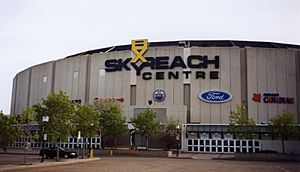
Early Years in the NHL (1979–1983)
When the Oilers joined the NHL, they lost most of their players from the WHA. But the team's owner, Peter Pocklington, had signed Wayne Gretzky to a special 21-year contract. Pocklington used this contract to make sure the NHL would let the Oilers join and keep Gretzky. The NHL agreed, allowing the Oilers to protect Gretzky.
The Oilers were placed in the Smythe Division of the Campbell Conference. In their first two NHL seasons, they weren't the best team, but they still made the playoffs. This allowed their young players to gain valuable experience. In 1981, the Oilers surprised everyone by beating the strong Montreal Canadiens in three games.
During these early years, the Oilers drafted many talented young players who would become very important to the team's success. These players included Mark Messier, Glenn Anderson, Jari Kurri, Paul Coffey, Kevin Lowe, Grant Fuhr, and Andy Moog.
In 1981–82, the Oilers became a top team, finishing with the second-best record in the NHL. However, they were upset in the first round of the playoffs by the Los Angeles Kings. One famous game from this series, known as the "Miracle on Manchester", saw the Oilers lose after being ahead 5–0. The next season, the Oilers reached the Stanley Cup Finals but were swept by the New York Islanders. In this season, Gretzky, Messier, Anderson, and Kurri all scored over 100 points. After the season, Lee Fogolin stepped down as captain and chose Gretzky to take his place.
Wayne Gretzky started setting new NHL records during this time. In his first NHL season, he won his first of eight straight Hart Trophies (MVP award). The next season, he won his first of seven straight Art Ross Trophies (scoring leader) by setting new records for assists (109) and points (164). In 1981–82, Gretzky set the record for goals with 92 and became the first player in NHL history to score 200 points (with 212). He also won his first of five Lester B. Pearson Awards (NHL MVP as chosen by players). Grant Fuhr also set a rookie record by going undefeated in 23 straight games. The Oilers also became the first NHL team to score 400 goals in a season, a feat they would achieve for five years in a row.
Dynasty Years (1983–1990)
In 1983–84, the Oilers had an amazing regular season, finishing with the best record in the NHL for the first time. They won a team record 57 games and scored 446 goals, a record that still stands. Gretzky scored over 200 points again. The Oilers also became the first NHL team to have three players score more than 50 goals: Gretzky (87), Kurri (54), and Anderson (52). Paul Coffey also became the second defenceman in NHL history to score 40 goals in a season.
In the playoffs, the Oilers swept the Winnipeg Jets and then faced their rivals, the Calgary Flames. The Oilers won that series in Game 7. After sweeping the Minnesota North Stars, the Oilers got a rematch with the Islanders in the Stanley Cup Finals. The Oilers won three games in a row in Edmonton to become the first former WHA team to win the Stanley Cup. They were also the first team from Western Canada to win the Cup in 59 years. After the series, Mark Messier won the Conn Smythe Trophy as the playoff MVP.
The Oilers were still very strong in the 1984–85 season. They finished second overall in the NHL. Gretzky scored his 1,000th career point in only his 424th game. He finished the season with 73 goals and 208 points. Kurri scored 71 goals, and Paul Coffey had another great season with 121 points.
In the playoffs, the Oilers swept the Kings and Jets. They then beat the Chicago Blackhawks in six games, scoring 44 goals, which is still an NHL record for one team in a playoff series. In the Stanley Cup Finals, the Oilers beat the Flyers in five games. Kurri tied a record with 19 goals in one playoff year. Coffey set a new record for points by a defenceman with 37. Gretzky had an incredible 47 points in only 18 playoff games and won the Conn Smythe Trophy. The 1984–85 Edmonton Oilers were voted the NHL's Greatest Team of its first 100 years.
During the 1985–86 season, the Oilers won the first ever Presidents' Trophy for having the best regular-season record. Gretzky set new NHL records with 215 points and 163 assists. Jari Kurri led the NHL in goals with 68, and Paul Coffey set a new record for goals by a defenceman with 48. The Oilers also had three players score over 50 goals again.
In the playoffs, the Oilers swept the Vancouver Canucks. Then they faced their rivals, the Calgary Flames, in a tough series. In the deciding Game 7, a rookie defenceman named Steve Smith accidentally scored an own goal, which meant the Oilers lost the game and the series. This ended their chance for a third straight championship. After the season, Wayne Gretzky won his seventh straight Hart Trophy, and Paul Coffey won his second straight Norris Trophy. Glen Sather won the Jack Adams Award as the NHL's Coach of the Year.
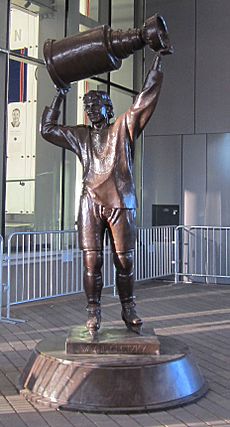
The 1986–87 season saw the Oilers determined to win the Stanley Cup again. They finished first overall with 50 wins and 106 points, winning their second straight Presidents' Trophy. Wayne Gretzky (62 goals, 183 points) and Jari Kurri (54 goals, 108 points) were the top two scorers in the NHL.
In the playoffs, the Oilers beat Los Angeles and Winnipeg. In the conference finals, they beat the Detroit Red Wings. Edmonton returned to the Stanley Cup Finals and faced the Philadelphia Flyers again. The Oilers won a tough Game 7 by a score of 3–1. After the game, Gretzky immediately passed the Stanley Cup to Steve Smith, helping him feel better after his mistake the previous season. Gretzky led the playoffs in scoring with 34 points. The Conn Smythe Trophy was given to the Flyers' rookie goalie, Ron Hextall, which was rare because he was on the losing team. Gretzky won his eighth Hart Trophy and seventh straight Art Ross Trophy.
For the 1987–88 season, some Oilers players missed training camp due to contract issues, and some were traded. Paul Coffey was traded to the Pittsburgh Penguins, and Andy Moog was traded to the Boston Bruins. Without Coffey and with Gretzky missing some games due to injury, the Oilers' regular season wasn't as dominant as before. Wayne Gretzky lost the scoring title for the first time in his career. The Calgary Flames won the Smythe Division and the Presidents' Trophy. Grant Fuhr had a great season, starting an NHL-record 75 games and winning 40.
In the playoffs, the Oilers beat the Winnipeg Jets. Then, in a highly anticipated series, they swept the Calgary Flames, even though many experts predicted Calgary would win. Gretzky scored an overtime winner in Game 2. The Oilers then beat the Detroit Red Wings in five games. In the Stanley Cup Finals against the Boston Bruins, Gretzky played incredibly well, setting a new record for points in the Finals with 13. The Oilers swept the Bruins 4–0 to win their fourth Stanley Cup in five years. A power outage during Game 4 in Boston caused the game to be cancelled, but the Oilers won the next game in Edmonton to complete the sweep. Wayne Gretzky led all playoff scorers with 43 points and won his second Conn Smythe Trophy. After winning the Cup, Gretzky started a tradition of having the entire team take a photo with the Stanley Cup at center ice. Grant Fuhr won the Vezina Trophy as the NHL's top goaltender.
The 1988 Oilers team set a record for the best playoff win percentage in the modern Stanley Cup era. In February 2006, a poll by Sporting News ranked the 1988 team as one of the top five professional sports teams of the past 120 years.
During the 1988 off-season, there were rumors that Gretzky would be traded. On August 9, 1988, Gretzky (along with Marty McSorley and Mike Krushelnyski) was traded to the Los Angeles Kings. In return, the Oilers received money and young players like Jimmy Carson and draft picks. Many fans in Edmonton were very upset about this trade.
Gretzky's departure was complicated. He had asked to renegotiate his contract, and he could have become a free agent after the 1988–89 season, meaning he could sign with any team without the Oilers getting anything in return. Peter Pocklington didn't want to lose Gretzky for nothing, so he traded him. The trade was seen as a disaster for the Oilers, and some players even thought about going on strike.
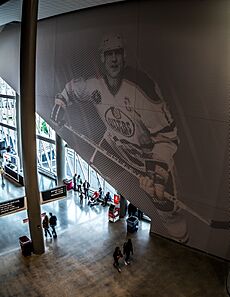
The 1988–89 season was difficult for Edmonton. Mark Messier was chosen to be the new captain. The Oilers' performance dropped, and they finished third in their division behind the Calgary Flames and Gretzky's Los Angeles Kings. In the first round of the playoffs, the Oilers faced Gretzky's Kings. The Oilers took a 3–1 series lead, but Gretzky and the Kings fought back and won Game 7, eliminating the Oilers.
After the 1989 season, Glen Sather stepped down as head coach but remained as general manager. He gave the coaching duties to his assistant, John Muckler. For the 1989–90 season, Grant Fuhr was injured, which allowed Bill Ranford to become the starting goalie. Jimmy Carson, who was part of the Gretzky trade, left the team, and Sather traded him to Detroit for players like Petr Klima, Adam Graves, and Joe Murphy. This trade helped the Oilers form a new "Kid Line." The Oilers improved their record and finished fifth overall in the NHL. Mark Messier had an outstanding season, finishing second in NHL scoring with 129 points.
In the first round of the playoffs, the Oilers faced the Winnipeg Jets in a tough series that went to Game 7, which the Oilers won. In the division finals, the Oilers swept the Los Angeles Kings. The Oilers then met the Chicago Blackhawks in the conference finals. Messier played a dominant game in Game 4, helping the Oilers tie the series and then win the next two games to reach the Stanley Cup Finals. They faced Boston again. This series is remembered for Bill Ranford's amazing goaltending and for Game 1, which was the longest Stanley Cup Finals game in modern NHL history, won by Petr Klima in triple overtime. The Oilers won their fifth Stanley Cup championship in seven seasons. Bill Ranford won the Conn Smythe Trophy for his excellent goaltending. Kevin Lowe won the King Clancy Memorial Trophy for his charity work, and Mark Messier won his first Hart Trophy as the league's MVP.
Seven players were part of every Edmonton Stanley Cup team: Mark Messier, Glenn Anderson, Jari Kurri, Kevin Lowe, Randy Gregg, Charlie Huddy, and Grant Fuhr. The Oilers had an incredible record during this time. Gretzky also set an NHL record by scoring at least one point in 51 straight games in 1983–84.
Transitional Years (1990–1996)
After Wayne Gretzky was traded, players became more aware of how much money they could earn. This led to salaries quickly increasing in the NHL. The Oilers, being in a smaller market, started to face financial challenges. Mark Messier wanted a new contract with a higher salary. Jari Kurri, unhappy with the Oilers' offer, chose to play in Italy for a season. Glenn Anderson also held out for a new contract.
1990–1991
The 1990–91 season was not great for the Oilers. They finished third in their division. Esa Tikkanen led the team in scoring.
In the playoffs, the Oilers met the Calgary Flames in a series that many consider one of the greatest ever. The series was very intense and physical. The Oilers took a 3–1 lead, but the Flames fought back to force Game 6, which Calgary won in overtime. In Game 7, the Flames took a 3–0 lead, but the Oilers rallied back and won 5–4 in overtime on a goal by Tikkanen. The Oilers then faced Los Angeles and won that series in overtime in Game 6. However, in the Campbell Conference Finals against the Minnesota North Stars, the Oilers ran out of energy and lost the series 4–1.
Mass Exodus (1991–1992)
In 1991, there were many rumors that the Oilers would trade away more of their star players. Adam Graves signed an offer with the New York Rangers, and the Oilers chose not to keep him. Tikkanen and Anderson wanted new contracts, and Grant Fuhr was available for trade.
Many key players were traded away. Paul Coffey was traded to Pittsburgh. Steve Smith was traded to Chicago. Jari Kurri and Charlie Huddy were also traded to Los Angeles. Mark Messier was traded to the New York Rangers for players and money. Messier wanted to earn more money than the Oilers could offer. Because the Oilers received cash in the Messier trade, some fans thought the owner, Peter Pocklington, was selling off the team's best players for his own profit.
Kevin Lowe was chosen to be the new captain. Despite losing so many important players, the Oilers had a similar season to the previous year, finishing third in their division. Vincent Damphousse, Bernie Nicholls, and Joe Murphy formed a new top line, with Damphousse leading the team in goals and points.
In the first round of the playoffs, the Oilers again met the Los Angeles Kings, who now had many former Oilers players like Wayne Gretzky, Jari Kurri, and Paul Coffey. The Oilers won the series in six games. The Oilers then beat the Vancouver Canucks in six games to reach the Campbell Conference Finals for the third straight season. However, their playoff run ended there as they were swept 4–0 by the Chicago Blackhawks. Joe Murphy had a great playoff performance, leading the team with 24 points.
1993–1996
By this time, fans in Edmonton were very unhappy with the Oilers. Attendance at games had dropped significantly due to the trades of Gretzky and Messier. There were even talks that the Oilers might leave Edmonton.
The Oilers also faced financial problems. Edmonton is a smaller market compared to other NHL cities, and the team struggled to compete with richer teams that could pay higher salaries. The Canadian dollar was also weaker than the US dollar, which was a disadvantage for Canadian teams. Peter Pocklington's other businesses also faced difficulties.
Many of the players from the Oilers' dynasty years continued to play at a high level on other teams. In 1993, the Kings, with six former Oilers, made it to the Stanley Cup Finals. In 1994, the Rangers won the Cup with seven former Oilers, including Messier, Lowe, Anderson, and MacTavish. This was the last hurrah for the great Edmonton team of the 1980s. Five of these players—Gretzky, Messier, Coffey, Kurri, and Fuhr—were named among the 100 greatest players in NHL history and were inducted into the Hockey Hall of Fame.
The departures of these stars showed that the Oilers' system for developing new players wasn't strong enough. The team had not drafted well during their dynasty years, which was hidden by their success. The young players were rushed into the NHL before they were ready.
The Oilers struggled in 1992–93 and missed the playoffs for the first time as an NHL team. They would not return to the playoffs for four straight years, even with new young players like Doug Weight and Jason Arnott.
Off the ice, the team was in trouble. Peter Pocklington was not willing to use money from his other businesses to support the team. In 1998, the team was almost sold to a group in Houston that wanted to move the team. But just hours before the deadline, a group of 37 Edmonton-based owners, called the Edmonton Investors Group, raised enough money to buy the team from Pocklington. They promised to keep the Oilers in Edmonton. The NHL supported this effort because two other Canadian teams had already moved to the United States earlier in the decade.
Return to the Playoffs (1996–2004)
In the 1996–97 NHL season, the Oilers made the playoffs for the first time in five years. In the first round, they upset the Dallas Stars, who had one of the best records in the NHL, in an exciting seven-game series. Goalie Curtis Joseph played very well, and Todd Marchant scored the winning goal in overtime in Game 7. Another highlight was in Game 3, when the Oilers came back from being down 3–0 with less than four minutes left to win 4–3 in overtime. Even though Edmonton lost to the Colorado Avalanche in the next round, fans were thrilled that the Oilers were back in the playoffs.
In 1998, Joseph led the Oilers to another first-round upset, this time against the Avalanche. The Oilers and Stars developed a rivalry, playing each other in the playoffs six times between 1997 and 2003.
On November 22, 2003, the Oilers hosted the Heritage Classic, the first outdoor regular-season hockey game in NHL history. The Oilers lost to the Montreal Canadiens 4–3 in front of over 55,000 fans at Commonwealth Stadium, which set an NHL attendance record. The 2003–04 NHL season was a disappointment as the Oilers missed the playoffs.
After the 2004–05 NHL lockout cancelled the 2004–05 NHL season, a new agreement was made that included a salary cap for all teams. This helped the Oilers, as all teams now had to spend within a budget, which was something smaller-market teams like Edmonton had been doing for years.
The Oilers made some big moves, signing former award-winning defenceman Chris Pronger and trading for forward Michael Peca. Fans hoped the team could return to its glory days. However, the team struggled with consistency, especially with goaltending and scoring. They traded for defencemen Jaroslav Spacek and Dick Tarnstrom. Right before the 2006 trade deadline, the Oilers added goalie Dwayne Roloson and speedy forward Sergei Samsonov.
These new players helped, and Edmonton finished the regular season with 95 points, getting the eighth and final playoff spot in the Western Conference. Young players like Ales Hemsky, Shawn Horcoff, and Jarret Stoll had great seasons.
2006 Stanley Cup Run
In the first round of the playoffs, the Oilers faced the Detroit Red Wings, who had the best record in the league. The Oilers, as the eighth seed, pulled off a big upset, winning the series in six games. This was their first playoff series win since 1998. Edmonton then met the San Jose Sharks in the Conference Semi-final. After being down 2–0 in the series, the Oilers won the next four games to advance to the Conference Final. In Game 6, Dwayne Roloson had a shutout. The Oilers became the first eighth-seeded team to reach a Conference Final since the NHL changed the playoff format in 1994. There, the Oilers defeated the Mighty Ducks of Anaheim in five games, winning the Clarence S. Campbell Bowl.
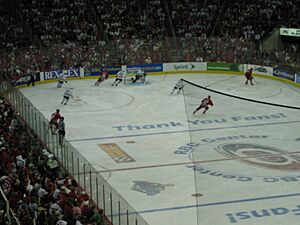
Edmonton continued their amazing run against the Carolina Hurricanes in the Stanley Cup Finals. In Game 1, Oilers starting goalie Dwayne Roloson was injured and couldn't play for the rest of the series. The Oilers fell behind 2–0 and 3–1 in the series, but they fought back to force a Game 7. Local hero Fernando Pisani scored an overtime shorthanded goal in Game 5, and they won Game 6 with a 4–0 shutout. However, they couldn't complete the comeback, as the Hurricanes won Game 7 to capture their first Stanley Cup. The Oilers still celebrated winning the Western Conference title.
Collapse and Playoff Drought (2006–2015)
Four days after losing the Stanley Cup Finals, Chris Pronger asked to be traded. On July 3, 2006, Pronger was traded to the Anaheim Ducks. Many other players from the 2005–06 team also left to sign with other teams.
Despite these losses, many of the Oilers' core players were re-signed, including Fernando Pisani and Dwayne Roloson. Jarret Stoll, Shawn Horcoff, and Ales Hemsky also signed multi-year deals.
During the 2006–07 Edmonton Oilers season, the team had a poor record and missed the playoffs. They struggled with many injuries and illnesses to players.
In May 2007, Daryl Katz offered to buy the team, promising to keep it in Edmonton. After several attempts, Katz finally bought the Oilers from the Edmonton Investors Group on February 5, 2008. The Katz Group also owned the naming rights to the Oilers' arena, Rexall Place.
In the off-season, the Oilers made some trades to get experienced players like Lubomir Visnovsky and Erik Cole. They also tried to sign star free agents.
In the following season, goalie Dwayne Roloson set an NHL record for being the oldest goalie to play 60 games in a season. However, the Oilers failed to make the playoffs. After the season, long-time head coach Craig MacTavish was fired and replaced by Pat Quinn.
The Oilers drafted talented young player Magnus Paajarvi-Svensson in 2009. They also signed veteran goalie Nikolai Khabibulin and former Oiler Mike Comrie. However, a big trade for star player Dany Heatley fell through because Heatley refused to be traded to Edmonton.
The 2009–10 season was one of the worst in franchise history, with the Oilers finishing last in the league. Many key players were injured for long periods. Dustin Penner emerged as the leading scorer.
On February 9, 2010, the Oilers announced that their inactive AHL team would move to Oklahoma City and begin playing in the 2010–11 AHL season. The team was later named the Oklahoma City Barons.
McDavid–Draisaitl Era (2015–Present)
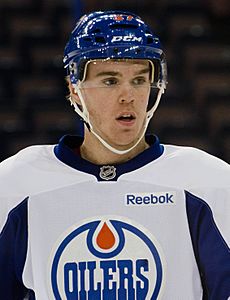
The Oilers won the 2015 Draft Lottery, moving them from the third pick to the first. This was their fourth lottery win in six seasons. The Oilers used this pick to select Connor McDavid first overall in the 2015 NHL Entry Draft.
On April 24, Craig MacTavish was replaced as general manager by Peter Chiarelli. Chiarelli made some trades, acquiring defenceman Griffin Reinhart and goaltender Cam Talbot. On May 19, Todd McLellan was named the new head coach. The Oilers also made changes to their scouting staff. On October 7, the Oilers decided to start the 2015–16 season without a team captain for the first time since 1979.
After the 2015–16 season, the Oilers moved from Rexall Place, their home since 1974, to the new Rogers Place. In their final game at Rexall, the Oilers beat the Vancouver Canucks. Oilers legends like Mark Messier and Wayne Gretzky skated on the ice one last time during a ceremony.
On June 29, the Oilers traded star winger Taylor Hall to the New Jersey Devils for defenceman Adam Larsson. Chiarelli also signed Milan Lucic to a long-term contract, hoping to make the playoffs for the first time since 2006. On October 5, 19-year-old Connor McDavid was named the 15th captain of the Oilers, becoming the youngest team captain in NHL history. The Oilers also traded Nail Yakupov and signed defenceman Kris Russell.
The 2016–17 season was a great success for the team. On March 28, 2017, the Oilers qualified for the 2017 Stanley Cup playoffs, ending their 11-year drought. The Oilers finished with a strong record, thanks to a 100-point season from McDavid and great play from Leon Draisaitl and Patrick Maroon. Goalie Cam Talbot also set a new team record with 42 wins. McDavid led the entire league in assists and points, winning both the Art Ross Trophy and Hart Memorial Trophy (MVP).
In the first round of the playoffs, the Oilers eliminated the San Jose Sharks. Their playoff run ended on May 10, when they lost to the Anaheim Ducks in Game 7.
In the 2017 off-season, the Oilers traded Jordan Eberle to the New York Islanders to free up salary space. They signed both McDavid and Draisaitl to long-term contracts. The Oilers had high hopes for the 2017–18 season, but they struggled and missed the playoffs.
On January 22, 2019, Peter Chiarelli was fired as general manager. The Oilers missed the playoffs again. On May 7, Ken Holland was named the new general manager, and three weeks later, Dave Tippett became the new head coach. In the 2019–20 season, the Oilers showed promise, but the season was suspended due to the COVID-19 pandemic. Edmonton was chosen as one of the host cities for the 2020 Stanley Cup playoffs. The Oilers qualified but were upset by the Chicago Blackhawks in the preliminary round.
In the 2020–21 season, the Oilers finished second in their division. Connor McDavid had an amazing 105-point season in just 53 games, becoming the second unanimous Hart Trophy winner in league history (after Wayne Gretzky). Leon Draisaitl also had an excellent season. The Oilers faced the Winnipeg Jets in the First Round of the playoffs and were swept in four games, with three of the losses coming in overtime.
In the 2021–22 season, the Oilers had their first 40-win season since 2017. McDavid had a career-high 123 points. The Oilers finished second in their division and faced the Los Angeles Kings in the First Round of the 2022 Stanley Cup playoffs. They won a very close series in Game 7. Then, they faced their provincial rival Calgary Flames for the first time since 1991 in what is known as the iconic Battle of Alberta. The Oilers won the series in five games. They advanced to the Western Conference Finals for the first time since 2006, but they were swept by the eventual Stanley Cup champion Colorado Avalanche.
In the 2022–23 season, three Oilers players—Connor McDavid, Leon Draisaitl, and Ryan Nugent-Hopkins—each reached 100 points. This was the first time since 1995–96 that one NHL team had three players score 100 points. The Oilers finished with 50 wins for the first time since the 1986–87 season. McDavid had a career-high 153 points, the highest single-season point total in the salary cap era. After beating the Kings in six games, they were eliminated in the Second Round by the eventual Stanley Cup champion Vegas Golden Knights.
In the 2023–24 season, the Oilers started slowly, which led to the firing of head coach Jay Woodcroft. But under new head coach Kris Knoblauch, the team improved greatly. During the season, the Oilers went on a 16-game win streak. Zach Hyman scored a personal high of 54 goals. Connor McDavid became the fourth player since 1990–91 to record 100 assists in a single NHL season, joining Wayne Gretzky, Mario Lemieux, and Bobby Orr.


